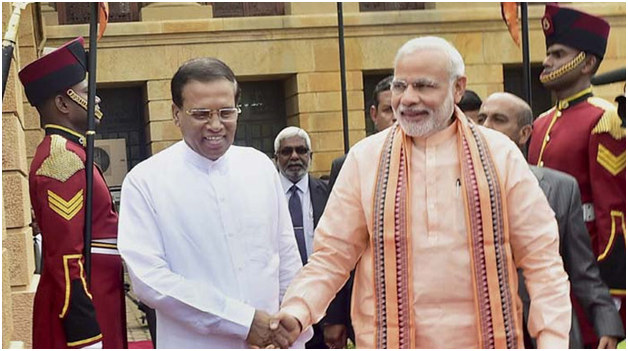Sri Lanka Reaches out to India, and the World
PM Narendra Modi with Sri Lankan President Maithripala Sirisena in Colombo

COLOMBO: The election of President Maithripala Sirisena and the appointment of a government headed by Prime Minister Ranil Wickremesinghe have seen a turnaround in relations with those within and outside the country. The improvement in international relations has been notable. The Prime Minister of India Narendra Modi who won election on a nationalist platform decided to be the first Indian prime minister in 28 years to visit the country.The last Prime Minister of India to visit, Rajiv Gandhi, was almost killed by a blow given to him by a member of the guard of honour who was angry about the signing of the Indo-Lanka Peace Accord which Sri Lankan nationalists felt was an affront to the country’s sovereignty. In the last few years, relations between Sri Lanka and India became strained, particularly on the issue of the post-war political solution promised by the former government, but which was not delivered as promised.
The visit of Prime Minister Modi to Sri Lanka, and the welcome he received from the government was echoed by virtually all sections of the polity. In his speech to the Sri Lankan parliament, the Indian prime minister said that India expected the government to go beyond the 13th Amendment to the constitution which devolved power to the provinces. However, he did not spell out what this would mean, leaving this to the Sri Lankan polity to address. There was also the pledge of greater economic cooperation and people-to-people exchanges. The grant of visa-on-entry facilities to Sri Lankans will be a boon to those who wish to visit India. In recent years there is hardly any country to which Sri Lankans can travel to without obtaining a prior visa. It is to be hoped that the period in which a traveler with a Sri Lankan passport was viewed with suspicion by immigration officials abroad is coming to an end.
Prime Minister Modi’s visit to Sri Lanka also demonstrates that Sri Lanka has much to gain by adopting a friendly attitude and non-confrontational attitude to the world. The confrontational approach of the previous government created an impression of a troubled and troublesome country that caused further problems to the country and its citizens. It was only partly the fear of being pursued for alleged war crimes that caused the former government leaders to take up adversarial stances in international diplomacy regardless of the global power of the countries it sought to confront. There was also a misplaced sense of national pride that came out of an overestimation of their own strength and a fear of the ill will of others that contradicted the ancient wisdom of the Hindu Buddhist ethos that “the world is one family to the wise.”
The government’s constructive engagement with the international community has also yielded it dividends in terms of the relaxation of post-war pressures for accountability with regard to the war crimes allegations. The UN report of war crimes was not released as scheduled in time for the March session of the UN Human Rights Council. Instead it has been delayed until the September session which gives the government more time to think through its own response and be in a position to show the international community that it will not ignore the issue of accountability. It is also noteworthy that the government has won this concession without itself compromising on the core position taken by the previous government that the issue of dealing with alleged war crimes is for Sri Lankan institutions to deal with, and is not for the international community.
The government’s constructive engagement is not only with the international community but is also domestically with civil society. The previous government’s relationship with civil society groups was strained. Former government leaders viewed civil society, in particular NGOs, as a national security problem and not to be empowered. The previous government brought the NGO Secretariat to which all NGOs were expected to report to the Defence Ministry in order to keep them under tight control. NGOs were compelled to obtain prior approval for their projects in the North and East. Their activities outside the North and East were not required to obtain prior approval, but were sometimes attacked by government sponsored goons with the police standing by. Civic activists were slandered as being anti national and pro LTTE in the government media.
This extremely hostile attitude towards non-governmental activities has changed with the new government. Today NGOs and members of civil society are actively working together with the government in areas that require their specialized skills. They have become editors of government newspapers, involved in anti-corruption investigations and are working as assistants to high ranking government leaders. The government has also invited members of civil society to join the government’s deliberations with South African government representatives over the formation of a domestic truth and reconciliation commission. Although government and civil society, by their very natures, will often see things differently, the sense of being at cross purposes and in an adversarial relationship is no longer prevalent.



